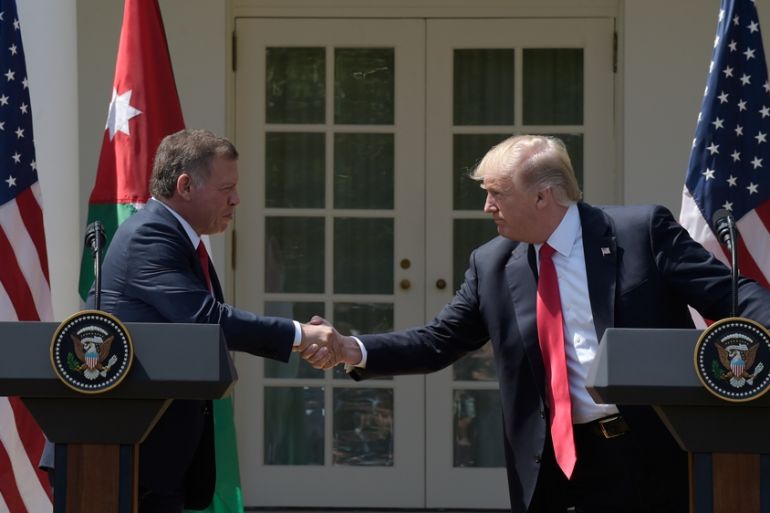Is Donald Trump ready to make a deal on Syria?
The US president is fond of saying his favourite thing in life is deal making.

The Trump administration is now starting to sound a lot like the Obama team when it comes to Syria. The message, after many fits, starts and contradictions, seems to be President Bashar al-Assad does not have a long-term future in Syria.
They are trying to shame Russia into abandoning their ally. We’ve heard all of that for years, so what could be different this time?
The Art of the Deal!
That’s right, US President Donald Trump prides himself on being one of the best negotiators in the business world. So when Jordan’s King Abdullah suggested a “horse trade” with Russia, that is the language the president loves and understands.
So what could that look like? The king indicated that the US should think about lifting sanctions on Russia over Crimea in exchange for help in Syria.
Many analysts in Washington don’t believe the Russians are particularly tied to Assad as long as they can be guaranteed their influence will continue under new leadership.
Secretary of State Rex Tillerson now says Assad has to go but he has also warned about what happens when a strong leader is suddenly removed. He uses Libya as the cautionary tale. Hence the emphasis on the long term.
‘Zones of stability’
So let’s imagine that Tillerson is not going to his first Moscow meetings empty handed. I’ve been talking to some very knowledgeable and connected people about what the US really means when they propose setting up zones of stability.
The best answer I’ve got so far is from Michael O’Hanlon of the Brookings Institution. Here’s what he had to say about a possible settlement to this long-running war:
“What we need to do is create autonomous areas in the east and the north where Sunni and Kurdish populations can live safely. And even though Assad is still nominally their president they live in areas that are largely self-policing where the international community even has a presence in helping reconstruct their cities, their economies, their police forces. The model here would be Iraqi Kurdistan in the Saddam Hussein period. Largely self-governing even though it was still part of the same country.
“We [US] could make clear we are not going to build an opposition capable of overthrowing the Syrian government any longer. We’re just going to help the opposition create these autonomous areas with light arms for local police forces.”
In this sense “zones of security” could be a precursor to “autonomous regions”.
READ MORE: What next for US-Russia ties after Syria strike?
It seems clear that the Syrian president would fight any effort that strips him of control of any part of his territory.
Russia could always try to persuade him if they are inclined by threatening to walk away leaving his forces vulnerable. That would leave it to Iran. If they decided to continue to back Assad, then this potential solution wouldn’t work. Not to mention how Turkey would react if the Kurds were given their own land. This situation is beyond complicated.
Every effort to find a way out of the horrors that have been inflicted on so many millions have simply failed to this point. The US president is fond of saying his favourite thing in life is deal-making. Millions now wait to find out if when it comes to Syria, he’s willing to try and make a deal.